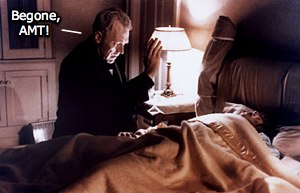Members of Congress introduced 7,440 bills this year and almost none of them help consumers in any meaningful way. Less than fifteen bills this session snagged our editorial love. Most cleared only one chamber, and some still haven’t earned a hearing—but maybe when Congress returns they’ll lob a few of our favorites towards Pennsylvania Ave.
congress

CPSC Head Nancy Nord Officially Thanks Congress For Consumer Product Safety Vote
Last week, the House of Representatives voted 407-to-0 to approve a consumer product safety bill that greatly increases the scope and power of the Consumer Product Safety Commission (CPSC).

Congress Postpones AMT Expansion For One Year
Today, Congress approved a one-year postponement of the Alternative Minimum Tax, which is good news for an estimated 25 million Americans (mostly middle-class) who would have qualified for it this year. The IRS said that due to the last-minute nature of the change, some refunds may be delayed: “Changes in the tax code require substantial work, especially in reprogramming I.R.S. computers.” The IRS says that “within 72 hours it would post on its Web site revisions to a dozen forms affected by the change.”

House Votes 407-0 To Ban Lead In Toys And Increase CPSC's Funding
Today the House of Representatives unanimously approved H.R. 4040, the Consumer Product Safety Commission Modernization Act of 2007, that virtually eliminates lead from children’s toys (down to 100 parts per million by 2012) and increases the funding of the CPSC. A Senate committee approved its own version of an anti-lead/pro-CPSC bill in October, but it hasn’t reached a floor vote yet—so sometime (early?) next year a final bill should be hammered out to send to the White House. Unless, of course, the lead toy furor disappears after Christmas.

Congress Set To Ban Soda, Junk Food From Schools
Snickers and Cokes would be a thing of the past at school cafeterias and vending machines if the Senate approves an ambitious amendment from Senators Harkin (D-IA) and Murkowsky (R-AK). The amendment to the Farm Bill would establish strict federal guidelines limiting the sale of deliciously unhealthy treats brimming with sugar, salt, and fat.
The nutrition standards would allow only plain bottled water and eight-ounce servings of fruit juice or plain or flavored low-fat milk with up to 170 calories to be sold in elementary and middle schools. High school students could also buy diet soda or, in places like school gyms, sports drinks. Other drinks with as many as 66 calories per eight ounces could be sold in high schools, but that threshold would drop to 25 calories per eight-ounce serving in five years.

Net Neutrality Roars Back Onto The Congressional Agenda
Net neutrality advocates led by Congressman Edward Markey (D-MA) are working overtime to turn net neutrality into an election year issue. Markey, who chairs the House Energy and Commerce Subcommittee on Telecommunications and the Internet, plans to introduce legislation later this month and push for hearings in both chambers. Could net neutrality actually make it through Congress this time?

White House Is Proposing Its Own Version Of Product Safety Plan
Today the White House will announce its own plan for how to tighten the country’s slack product safety practices. The proposal is being offered as an alternative to the one Congress has come up with, which the White House—along with industry trade groups and Consumer Product Safety Commission head Nancy A. Nord—think is too mean to manufacturers.
The White House version suggests stationing inspectors in other countries to inspect goods before they are shipped to U.S. shores, because “with $2 trillion in imports annually, inspections at the ports had become ineffective.” We’re not sure how the math works on that one—unless sharks or pirates consume large amounts of imports during transit, the same number of goods leave foreign ports and arrive at ours, and having inspectors all in one place where they can work together, instead of spread out in each foreign country, seems a more efficient use of resources. But we’re probably just stupid from too much lead.
Washington Has Had Enough Of CPSC Chair Nancy Nord
It seems that more than a few people in Washington have had just about enough of Nancy Nord and her whole “No, don’t make my agency regulate the industry its supposed to regulate” thing. Nancy has come out against currently proposed legislation that would give the CPSC both more money and more power, because she says it would make consumers “less safe” by overwhelming her office with complaints about trivial stuff.
../../../..//2007/10/26/the-senate-has-approved-an/
The Senate has approved an extension of the ban on state Internet access taxes for 7 more years. This follows a similar vote in the House a couple of weeks ago. The two chambers now have to work out any conflicts and send the bill to Bush, who has indicated he will approve it. [Reuters]

A Bunch Of Groups Compromise On State Meat Inspections
From the “boring but important” category of meat-related news, the Consumer Federation of America has joined with other advocacy groups as well as union and labor groups, under the assistance of men and women in Congress, to work out a compromise in response to July’s ill-conceived attempt by Minnesota Rep. Collin Peterson to do away with the federal inspections requirement for interstate meat sales. The new plan augments Peterson’s measure in a way that ensures state-inspection procedures meet or exceed federal ones.
FTC Vows Not To Expire Numbers From The Do Not Call List
The FTC will vow in Congressional testimony today not to purge numbers on the Do Not Call List while Congress considers making registrations permanent. Do Not Call registrations currently last for five years, and are set to start expiring in April 2008 despite the list’s broad popularity: 92% of Americans have heard of the list, 76% have added their number, and 92% claim to receive fewer calls marketing calls. Lydia Parnes, Director of the FTC’s Bureau of Consumer Protection, appearing before the House Energy and Commerce Subcommittee on Commerce, Trade, and Consumer Protection will hail the list for ‘restoring the sanctity of the American dinner hour.’

Liveblogging The Senate Commerce Committee Hearing: Cellphone Companies And The Customers They Hate
Today at 10 a.m., the Senate Commerce Committee will pry through bone and muscle to see if cellphone companies really do have hearts of pure stone. The Committee will question the industry’s most egregious practices: junk fees, illegal contract extensions, and early termination fees. The industry is working overtime to cast itself as the consumer’s best friend, with AT&T recently agreeing to prorate ETFs as part of a desperate attempt to show that federal regulation is unnecessary.
../../../..//2007/10/16/a-group-of-congressmen/
A group of Congressmen used Simpsons characters without permission in a weird press release that involves Mr. Burns, Mayor Joe Quimby, some anti-MoveOn swipes and a little incest humor. Fox has said they did not authorize the usage and that the characters “may not be used in this manner,” but TechDirt wonders whether the network will sue? (We’re thinking no.) [TechDirt]

House Investigators: The Chinese Government Can't Protect Its Own Citizens, Let Alone Ours
Investigators from the House Energy and Commerce Committee spent two weeks snooping around China and probably haven’t eaten since. Their investigation revealed a tattered regulatory framework, unable to protect Chinese citizens, let alone foreigners. Among the disturbing facts uncovered:

Should Do Not Call List Registrations Last Forever?
Powerful Members of Congress are backing measures that would prevent Do Not Call registrations from expiring. Though the list has proven wildly popular, covering 150 million numbers in a country of 300 million, the FTC currently expires listings after five years to ostensibly account for people who move or change their number. Proposals to make registrations permanent have already won over the editorial board of the Asheville Citizen-Times:
The popularity of the list confirms that few people want to have their dinner or other personal time interrupted to deal with a telemarketer intent on selling something. The argument that people can just not answer the phone doesn’t work for everyone. Those with loved ones overseas or with family members who need special care are usually unwilling to risk missing a call that might bring critical or time-sensitive information.




